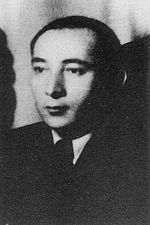Saifuddin Azizi
| Saifuddin Azizi | |||||||||||

Saifuddin Azizi in 1950
|
|||||||||||
| Chinese name | |||||||||||
|---|---|---|---|---|---|---|---|---|---|---|---|
| Traditional Chinese | 賽福鼎·艾則孜 | ||||||||||
| Simplified Chinese | 赛福鼎·艾则孜 | ||||||||||
|
|||||||||||
| Uyghur name | |||||||||||
| Uyghur |
سەيپىدىن ئەزىزى
|
||||||||||
|
|||||||||||
| Transcriptions | |
|---|---|
| Standard Mandarin | |
| Hanyu Pinyin | Saìfúdǐng Àizézī |
| Wade–Giles | Sai4-fu2-ting3 Ai4-tse2-tzu1 |
| IPA | [sâi̯fǔtìŋ âi̯tsɤ̌tsɹ̩́] |
| Transcriptions | |
|---|---|
| Latin Yëziqi | Seypidin Ezizi |
| Yengi Yeziⱪ | Səypidin Əzizi |
| Siril Yëziqi | Сəйпидин Əзизи |
Saifuddin Azizi (; March 12, 1915 – November 24, 2003), also known as Seypidin Azizi, Saif al-Dīn ʿAzīz, Saifuding Aizezi, and Saifuding, was the first chairman of the Xinjiang Uyghur Autonomous Region of the People's Republic of China.
Azizi was born in Tacheng to an influential Uyghur trader family originally from Artux. He attended school in Xinjiang, and then moved to the Soviet Union, joining the Communist Party of the Soviet Union (CPSU) and studying at the Central Asia Political Institute in Tashkent. He returned to Xinjiang as a Soviet agent, instigating the Soviet-backed Ili Rebellion against the Republic of China government in northwest Xinjiang. He served as Minister of Education in the Second East Turkestan Republic and Commissioner of Education in the Zhang Zhizhong Ili Rebel-Kuomintang coalition government from 1945-1948. In September 1949, Saifuddin attended the Chinese People's Political Consultative Conference endorsed by the Communist Party of China (CPC), becoming a member of the new Communist government. In October, the 1949 Chinese revolution brought the Communists to power in Xinjiang and in China more generally; at this point, Saifuddin held various posts for Nationalities and Political and Legal Affairs for the new government.
From December 1949 through January 1950 he accompanied Mao Zedong in his trip to Moscow to negotiate the Sino-Soviet Treaty of Friendship, and it was there on December 27, 1949 where he quit the CPSU and joined the CPC in accordance with recommendation of Mao himself. In 1955, he registered with Mao his strong objection to proposals to name Xinjiang the "Xinjiang Autonomous Region", arguing that "autonomy is not given to mountains and rivers. It is given to particular nationalities." As a result, the administrative region would be named "Xinjiang Uyghur Autonomous Region".
...
Wikipedia
